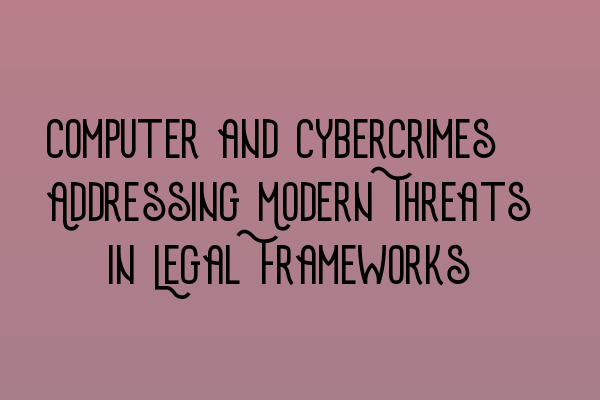Computer and Cybercrimes: Addressing Modern Threats in Legal Frameworks
With the rapid advancement of technology, computer and cybercrimes have become an alarming issue in today’s digital world. It is essential for legal frameworks to evolve and adapt to address these modern threats effectively. In this blog post, we will explore the challenges posed by computer and cybercrimes and discuss the necessary steps for enhancing legal frameworks to combat them.
Understanding Computer and Cybercrimes
Computer and cybercrimes encompass a broad range of illegal activities committed through the use of computers and the internet. These crimes can include hacking, identity theft, online fraud, phishing, malware attacks, and many more. The sophistication and complexity of these crimes require a comprehensive legal approach to ensure both prevention and prosecution.
One important aspect of addressing computer and cybercrimes is creating strong legislation that specifically targets these offenses. Laws need to be constantly updated to keep up with the ever-evolving techniques employed by cybercriminals. By incorporating keywords such as “SQE 1 Practice Exam Questions” and “SQE 1 Practice Mocks FLK1 FLK2,” legal professionals can stay up to date with the latest examination material.
Enhancing Legal Frameworks
To effectively address computer and cybercrimes, legal frameworks must focus on several key areas:
- Legislation: Strong legislation is the foundation of combating computer and cybercrimes. Legislators should work closely with legal experts and cybersecurity professionals to design comprehensive laws that account for various types of offenses and their accompanying penalties.
- Law Enforcement: Adequate training and resources should be provided to law enforcement agencies to enhance their capabilities in detecting, investigating, and prosecuting computer and cybercrimes. Ongoing training courses like “SQE 2 Preparation Courses” can help legal professionals stay knowledgeable about the latest techniques used by cybercriminals and assist in building stronger cases.
- International Cooperation: Cybercrimes operate on a global scale, making international cooperation crucial for effective prevention and prosecution. Encouraging collaboration between countries in exchanging information and coordinating efforts can significantly strengthen the legal response to computer and cybercrimes.
The Role of Legal Professionals
Legal professionals play a critical role in addressing computer and cybercrimes. By staying informed and updated on the latest developments in cybersecurity and legislation, they can provide effective counsel to clients and contribute to the establishment of robust legal frameworks. SQE Criminal Law & Practice Law UK offers comprehensive courses like “SQE 1 Preparation Courses” to equip aspiring legal professionals with the necessary knowledge and skills to excel in this field.
It is also important for legal professionals to stay updated on upcoming SRA SQE Exam Dates to ensure they are adequately prepared for the qualification exams. By clicking on this link, you can access the relevant information.
In conclusion, computer and cybercrimes present significant challenges in today’s digital world. By integrating the suggestions mentioned above and continuously updating legal frameworks, we can create a safer online environment and effectively combat these modern threats. Together, we can work towards a future where technology and security coexist harmoniously.
